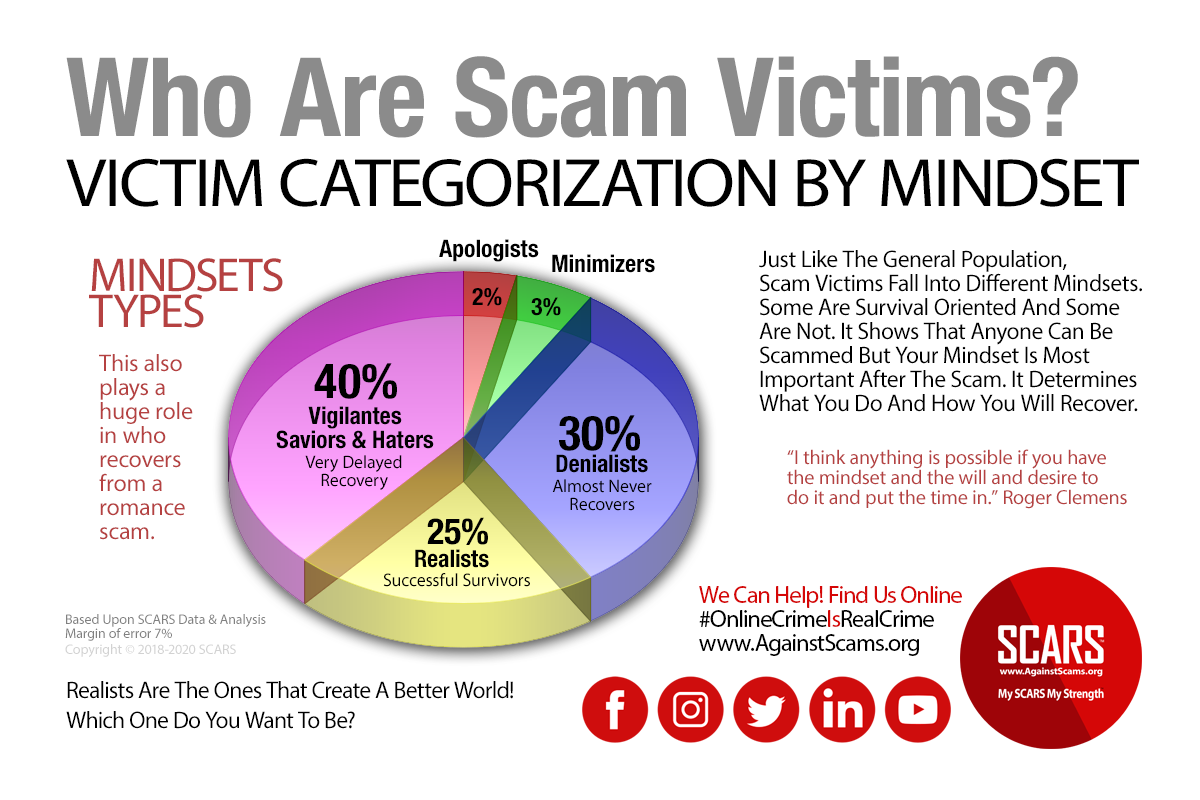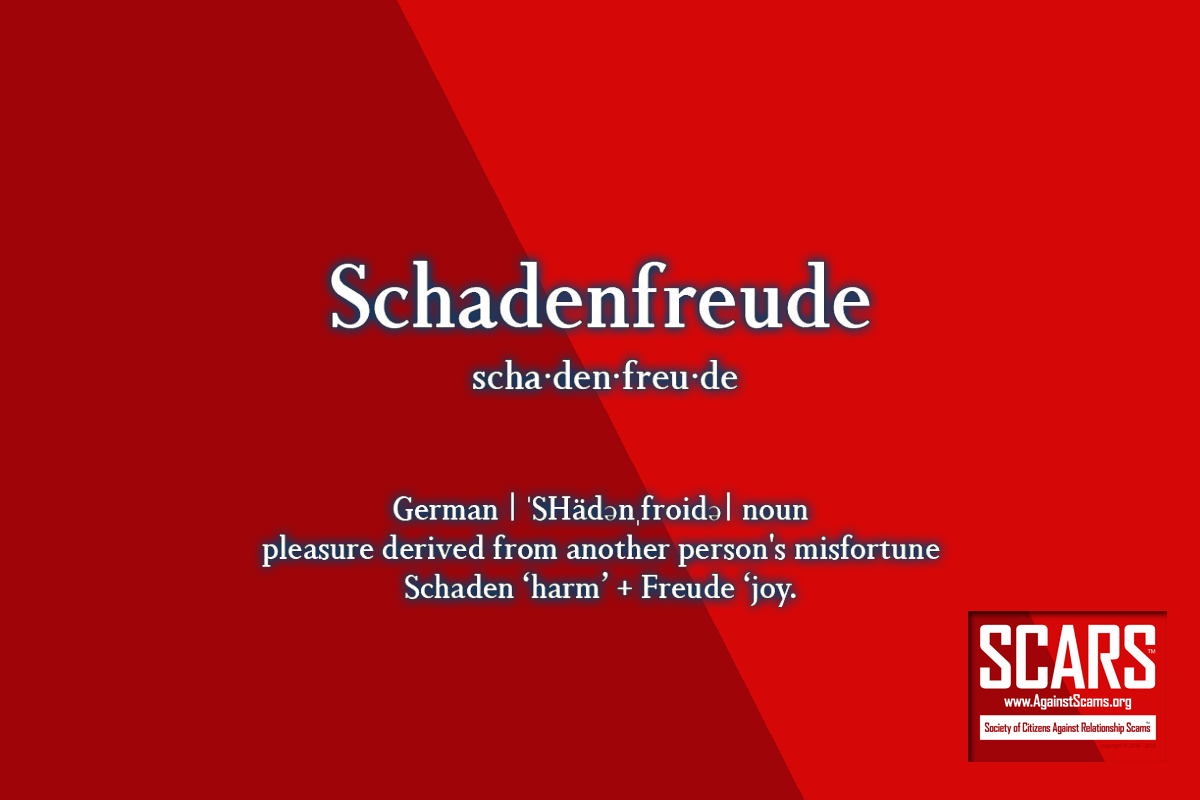The Dark Side Of Victim Psychology
For Many Years We Have Attempted To Understand The Obsessions Many Scam Victims Experience With Scammer Photos!
PLEASE NOTE: This is not presented to make victims feel bad. This is shared to help victims take a look at their own emotions in the hope that it can bring insights. Recovering after a relationship scam can have lasting effects and few of them are good. The trauma can manifest in so many ways, but being informed means that you can watch for these responses in yourself and take appropriate corrective measures.
Most victims, especially those that are still carrying substantial anger argue that they want to see scammer photos to avoid future scams.
But there is something deeper in this replacement addiction – replacing the addiction of the scam for a new addiction (or obsession) with scammer photos. It is almost like viewing the photos of scammers satisfies a need in this group of victims, like “rubbernecking” when passing a fatal car accident on the road.
“There’s something else that’s a little bit darker, that a lot of people don’t want to accept, but there’s this sense of relief that it wasn’t you.”
We see the same thing in the fascination with crime stories on the news. Partly it is cautionary alerting you to increased risk, but there is something else there! When you see it on screen, or by the side of the road, you say, “it wasn’t me, thank God.” And so there’s that same sense of relief that whatever happened – it happened to someone else instead of you.
A significant number of people have this impulse when first hearing of a tragedy.
So what is this thing and how does it apply to our situation?
This Is Called: “Schadenfreude”
scha·den·freu·de[SHädənˌfroidə]
PLEASURE DERIVED BY SOMEONE FROM ANOTHER PERSON’S MISFORTUNE.
That sounds harsh, but let us explain what we mean before you make a snap judgment about this topic!
What Is Schadenfreude?
Schadenfreude is the experience of pleasure, joy, self-esteem or self-satisfaction that comes from learning of or witnessing the troubles, failures, or humiliation of another.
Schadenfreude is a complex emotion
Rather than feeling sympathy towards someone’s misfortune, schadenfreude evokes joyful feelings that take pleasure from watching someone fail. This emotion is displayed more in children than adults, however, adults also experience schadenfreude, they are just better at concealing their expressions from others and even from themselves. It can be very pronounced or very subtle, and many times you are not even aware you are doing it. But it is there!
We know how to enjoy failures in others. But ask us to name this enjoyment, and our language falls into a hypocritical silence. It averts its gaze and squirms. And so we turn to the Germans, so well known for their precision to have just the right word.
From “schaden” meaning damage or harm and “freude” meaning joy or pleasure – results in “damage-joy.”
In English it might be called: “vicarious joy from misery.”
No one likes to think about their flaws, but it is in them that so much of what makes us human is revealed. Enjoying other people’s misfortunes might sound simple – a mere glint of malice, a flick of spite. But look closer and you’ll glimpse some of the most hidden yet important parts of our lives.
Basically, it is a psychological process of making yourself feel better by putting other people down or more precisely seeing others feel pain or discomfort.
It is not always out in the open, and many times the other person is not aware they are doing it. It is kind of the opposite of empathy.
How Does This Relate To Scams And Scam Victims?
How does something that sounds so evil relate to scam victims?
Let us first revert back to the types of scam victims – a taxonomy!
Remember that there are basically three main categorizations of romance scam victims (in our experience):
- Deniers / Denialists
- Angry / Vigilante Haters
- Realists
Scam Victim Mindsets
It is important to remember that recovering from a scam is a process, and during that process, victims move through these stages or mindsets.
Those that successfully recover have moved through denial, and through anger, into becoming realists. This is what allows them to acknowledge and accept their scam and move forward. Unfortunately, about 2/3 of scam victims do not migrate through to realism and stay trapped in Denial or Anger (at least for an extended period of time.)
During that phase of anger, we see the darker side of human nature more often emerge in victims. We see anger directed against other victims, against those offering help and support, against law enforcement – general rage against everyone. It is also where we see the “Saviors” emerge who think only they can save other victims!
However, it appears that in this anger is also born the Schadenfreude.
Misfortune of Others
- The Japanese have a saying: “The misfortune of others tastes like honey”
- The French speak of “joie maligne,” a diabolical delight in other people’s suffering
- In Danish it is “skadefryd”
- In Hebrew, “simcha la-ed”
- In Mandarin, “xìng-zāi-lè-huò”
- In Russian, “zloradstvo”
- For the Melanesians who live on the remote Nissan Atoll in Papua New Guinea, it is “banbanam.”
- Two millennia ago, the Romans spoke of “malevolentia”
- Earlier still, the Greeks described “epichairekakia” (literally epi, over, chairo, rejoice, kakia, disgrace).
A study in Würzburg Germany carried out in 2015 found that football fans smiled more quickly and broadly when their rival team missed a penalty than when their own team scored.
“To see others suffer does one good,” wrote the philosopher Friedrich Nietzsche. “This is a hard saying, but a mighty, human, all-too-human principle.”
There has never really been a good word for these grubby delights in English. In the 1500s, someone attempted to introduce “Epicaricacy” from the ancient Greek, but it didn’t catch on.
There could only be one solution as a journalist in the magazine “Spectator” asserted in 1926: “There is no English word for schadenfreude because there is no such feeling here.” He was wrong, of course.
Scams & Scam Victims
When we look at how scam victims express themselves we see these tendencies emerge in many different ways.
Minimizing A Victim
Many victims have felt others try to minimize their experience.
From police officers to family and friends, people seem to take some delight in putting the romance scam trauma down as “not that bad” or “Not as bad as what they had experienced.”
We see the same expressions throughout society when a victim tries to relate their experience to others. The listeners tend to try to quantify it or compare it rather than just express sympathy for the pain and suffering that the victim experienced.
Sadly, this is wired into our cultures worldwide. In one form or another, now that we know of this we can see it almost everywhere – people minimizing the pain of others to feel better about themselves. While there is some disagreement, we view this as variations on Schadenfreude.
Victim Blaming
We recently saw victims trying to put down other romance scams victims as not being “real” victims because they had not lost any money. Thus their experience was not as “real” or as “bad” as the ones that had lost money. In fact, they claimed, it wasn’t even a scam unless you lost money. Completely false.
We know the definition of a “scam” is not about money or property, it is about deception. A victim can be profoundly deceived and money never enters into the deception.
Advertisers deceive, politicians deceive, our children deceive, and it all hurts. The magnitude of the pain is a function of how completely we internalize the deception, not the money we lose (though that certainly hurts too.)
But more than that, the people who blame the victim are also expressing their own feeling that “thank god it was not me” in the process of blaming.
We also see this in comparisons between magnitudes of financial loses. Victims who have lost little have a much harder time understanding those that lost very large amounts – yet the mechanisms of manipulations and the trauma are exactly the same regardless of the size of the loss.
Love Of Gore
Why do people like to look at gory movies?
Because it is not them! Though if they had to look at a real dead body other emotional responses would come to the forefront. But viewing it vicariously, we see the same sort of vicarious joy at the misfortunes of others take place.
Rooted in this is also one of the reasons behind the obsession with scammer photos that blanket the web and social media.
Scammer Photo Obsession
Many (especially angry victims) will argue that looking at scammers’ photos helps them (and others) avoid scams in the future. Unfortunately, this is mostly not true.
With billions of fake identities in use and stolen photos from hundreds of thousands (perhaps millions? or tens of millions?) of impersonation victims, there are vastly more stolen photos from more different people than could ever be cataloged. The mere act of trying to catalog them all is completely futile. Yet victims make this their obsessions to do it believing that this somehow benefits other victims and will magically stop scamming. Again it is not true.
- It is true that some of this does help a small number of victims who sat on the edge and just needed a small push to recognize they were being scammed.
- It is true that posting photos makes it possible to confirm a small number of scams (about 2-3%).
- Some of it does help some victims better understand how scams function.
- But the vast majority of it is obsessive both by the people doing it and by those viewing them.
- Worse still, statistically, as many as half of those viewing them will be scammed more than once – some over and over. The haters, of course, deny all fo this and stick to their urban legends and amateurish belief systems – stomping through people’s lives doing more damage in the process!
Saviors Posting Photos
For those trapped in the obsession of posting endless streams of stolen photos, this becomes the expression of their anger towards scammers. It can also is the expression of their “Savior Syndrome” where they believe “only they” (by posting these photos) they can save other victims.
However, this is more of an exercise in continuing to feed their anger towards their scammer and their scam experience, while trying to justify their feelings of anger and rage.
Vicarious Joy In Looking At Scammer Photos
We see that for most victims that are obsessively or addictively trapped in looking at scammer or stolen photos it is more than just a desire for awareness.
NOTE: Let us clearly say that there are many who are engaged in real actions against scammers and they are not fueled by this. Such as cooperating to have fake or scammer profiles removed. We view their motivations as being quite different – they are taking positive actions to make the world a better place!
But for most, who simply gravitate to places where endless streams of scammer photos are posted it seems to be about the satisfaction or relief they feel when viewing them (Schadenfreude). Meaning that in viewing the multiplicity of endless scammer photos these victims feel relief that it was not them that was scammed by this photo or that. It is the same kind of feelings that people experience when looking at photos of criminals going to jail in the news – we say it is a “satisfaction and a sense of justice,” but it is more than that.
It is these same kinds of feelings when the media white-washes someone as criminal or corrupt, regardless of guilt or innocence. The corporate news media knows that branding someone sells newspapers and attracts viewers.
Getting back to stolen photos – we have found that many victims do not even care if the photo was stolen or not. Many victims are “happy” even if the “blame” is applied to the real person in the stolen photo almost as much as to the scammer behind it.
Scammer Photo Trauma
In our experience, the continued viewing of scammer photos (real or stolen) comes at a significant cost to the victim.
This manifests itself in a couple of profound ways:
- Those that obsess about these photos and continue to frequent places that display them (almost to the exclusion of anything else) are increasing the trauma victims experience. In numerous studies of crime victims viewing mugshots, we see that these victims experienced heightened levels of fear and anxiety after viewing the photos. That constant exposure to these photos may reinforce or increase the trauma or even PTSD that victims feel.
- Like professionals that are repeatedly exposed to inhumanity, such as police and first responders, vicarious trauma builds up over time. Vicarious trauma is the experience of the trauma of others and internalizing it. It can result in a burn-out of empathy for those that experience it and affect their lives in numerous other ways.
Those that argue that continuous viewing of scammer photos is somehow important to have no real understanding of the damage they are causing. This is one of the most widespread of destructive urban legends disseminated by amateur anti-scam groups.
The Increasing Belief In Futility
Another of the side effects of constantly viewing scammer photos is the deep sense that no one is doing anything, that nothing is being done to stop this.
It develops a deep sense of futility, which then holds that victim back from taking positive action themselves. It can prevent a victim from seeking proper support to recover or increase despair.
We see this in the small number of reports that are made to law enforcement – currently well below 10% – meaning over 90% of all scams go unreported – because victims feel it is futile, it will make no difference. These photo exposure amateur anti-scam groups hold victims in their environment and feed them a constant stream of never-ending futility.
Yet, the truth is the exact opposite. In 2018 over 21,000 scammers were arrested because of reports – directly or indirectly. Reporting matters – always! And equally important is that much is being done!
In Summary
What does this help us learn from Schadenfreude and how it relates to the experience of scam victims?
We view this as a lesson in how victims can help themselves by recognizing their own characteristics and behaviors. We all have things about ourselves that we are not aware of, but now that you are aware of this emotional characteristic you can look for it and alter how you respond in different situations.
It may not always be possible to help yourself “work through” them, and for this reason, we strongly recommend that a local counselor or therapist can be essential in helping every victim work through these issues. CLICK HERE » to find help!
Amateur anti-scam groups may be entertaining for a while, but they can also be dangerous because they are playing with your mental health. That is why professional help matters!
Our strongest recommendation is that as quickly as possible turn away from the scammers and focus on yourself.
Stop looking at scammers – recognize and turn off your obsession – and turn towards others who have shared your experience in a proper support group setting. Try to minimize your exposure to the criminals, and stay focused on learning why this happened to you so you can avoid it in the future.
Get the help you need! Find a local counselor, find a real support group, start recovering!
We hope you will!






Please Leave A Comment - Tell Us What You Think About This!